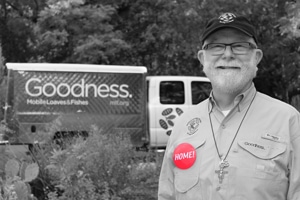Alan Graham’s Leadership Austin Essential experience (Class 16 – 1995) coincided with his transition away from the for-profit real estate development industry and, ultimately, his founding of Mobile Loaves & Fishes in 1998. Alan documented that journey in his 2017 book Welcome Homeless: One Man’s Journey of Discovering the Meaning of Home. We last interviewed Alan in 2015. We recently sat down with him again to catch up and visit more about his opinions on leadership in general (and Leadership Austin, specifically).

Why did you apply for the Leadership Austin Essential program?
It was probably mostly for selfish reasons. I wanted to build my network. What’s funny is, I first applied in the early 80’s. I had an employee working for me at the time named Greg Guy. Greg got in and I didn’t. I didn’t apply again until 10 years later. That’s just one of those failure-as-learning moments. You’ve got to keep trying.
So your primary motivation was networking. Is that what you ended up getting out of the program?
Yes, sort of. But more than that. I met people who I’m still close to and collaborating with. I got relationships out of it.
In our 2015 interview, you mentioned that you were one of two people in your cohort who seemed to have more conservative views on issues. What was that like?
I’d say that there was more discomfort than comfort in that experience. But that was because we all had stereotypes. Hopefully we move beyond those as we get older and have more experience. Honestly, it was a blessing because I interact with so many people who come from different backgrounds in my work. That’s the miracle of Leadership Austin – it brings diverse people together to sit down and talk with one another.
Can you speak to the experience of having a conservative viewpoint in Austin?
I love it. I’ve grown a lot. I have a deep level of respect for what other people believe and where they’re coming from. I was speaking with a friend recently about Alexandria Ocasio-Cortez and how she might be the best thing that’s ever happened to the Republican party because she is making people pay attention. Different perspectives cause people to think. We’re lucky to live in a place where that can happen – in other countries, you get your head cut off for thinking differently.
I’m also lucky because the space I work in is apolitical.
Everyone believes in this work, regardless of their religion or politics. We
all vote our consciences privately in the voting booth, but can still agree on
this.
Do you have advice for people who are leading from different, sometimes opposing, viewpoints?
In the old days, leaders would sit down at the end of the day and drink scotch together, or pick up their kids together, eat at the same restaurants. We have to get back to that. We need more Newt Gingriches and Bill Clintons, or Ronald Reagans and Tip O’Neills. We need collaboration. Stop focusing on the divisive issues. Tons of legislation is getting passed, but we only focus on the divisive issues. Let’s focus on the collaboration that is happening.
In our 2015 interview, you cite relationship building as the foundation of your success with food truck outreach in the early days of Mobile Loaves & Fishes. Relationships are also a principle that we teach at Leadership Austin. What do you think about the transition away from in-person interactions in the Digital Age?
It’s killing us culturally. It’s a double-edged sword. But people have a hunger to connect and you can’t really connect digitally. The “digital community” is horse hooey. There is no thriving in a digital community. All of the anger and vitriol in our world today is a manifestation of the digital world. We need person-to-person interaction.
Establishing or re-establishing “community” is at the core of your work in responding to and ending homelessness. How do you see the definition of “community” changing as Austin transitions from a city to a region?
I’ve lived here since 1976 and have seen the most extreme growth in Austin’s history. I love it here more now than I did then. But I do see isolationism causing a disconnect from community. Suburban subdivisions isolate. I call them “hermetically-sealed single-family sarcophaguses”. If I were the Housing Czar, I would ban backyards. I would create a policy that said for every square foot of house, you are required to have one-third of a square foot of front porch. So you would have these big front porches. And you would sit on your front porch, and when your neighbor walked by with her dog, you would say, “Hey! How’s it going?”
In our 2015 interview, you said you didn’t think someone who is 30 or 35 can be a leader. Do you still believe that?
It’s difficult for a young person to have failed enough times to know how to lead. It’s not impossible, but they just don’t have that experience. Failure is learning. Amber Fogarty, the President & Chief Goodness Officer at Mobile Loaves & Fishes, uses this quote from John F. Kennedy: “Leadership and learning are indispensable to each other”.
What would you say to our current Emerge cohort, where the average age is 31?
We get these resumes from all kinds of people for jobs at Mobile Loaves & Fishes. I always ask them to tell me about five times they failed, and how they overcame those failures. Leadership is a lifetime of learning. Never stop learning.
Learn more about Alan and his work. Subscribe to Alan’s podcast, Gospel con Carne.
Follow the 40 Stories in 40 Days campaign on Instagram and on our website.
